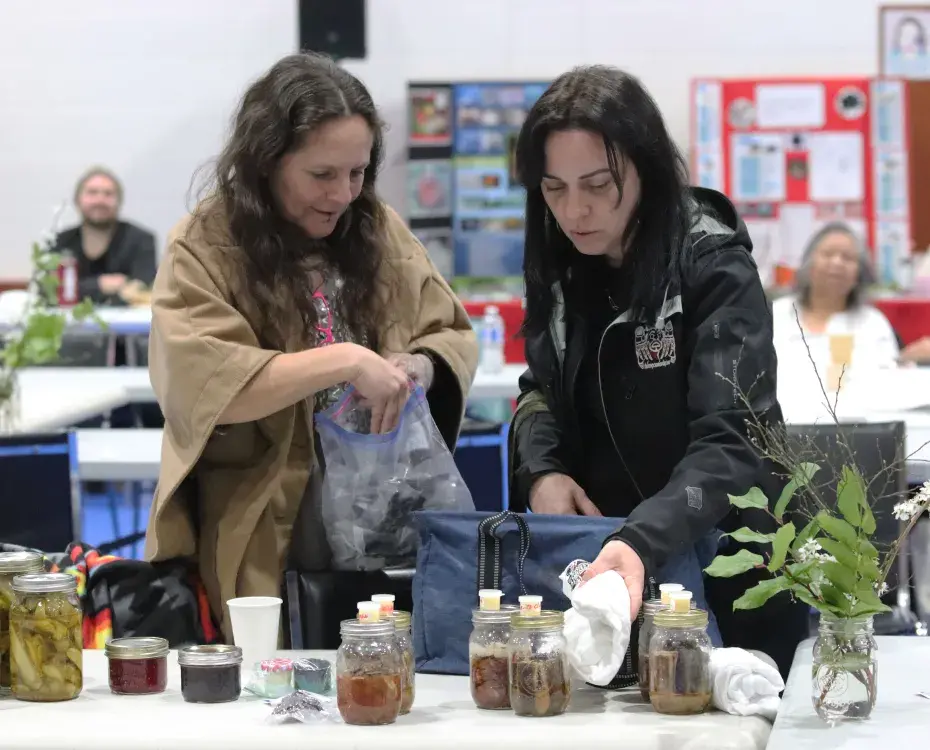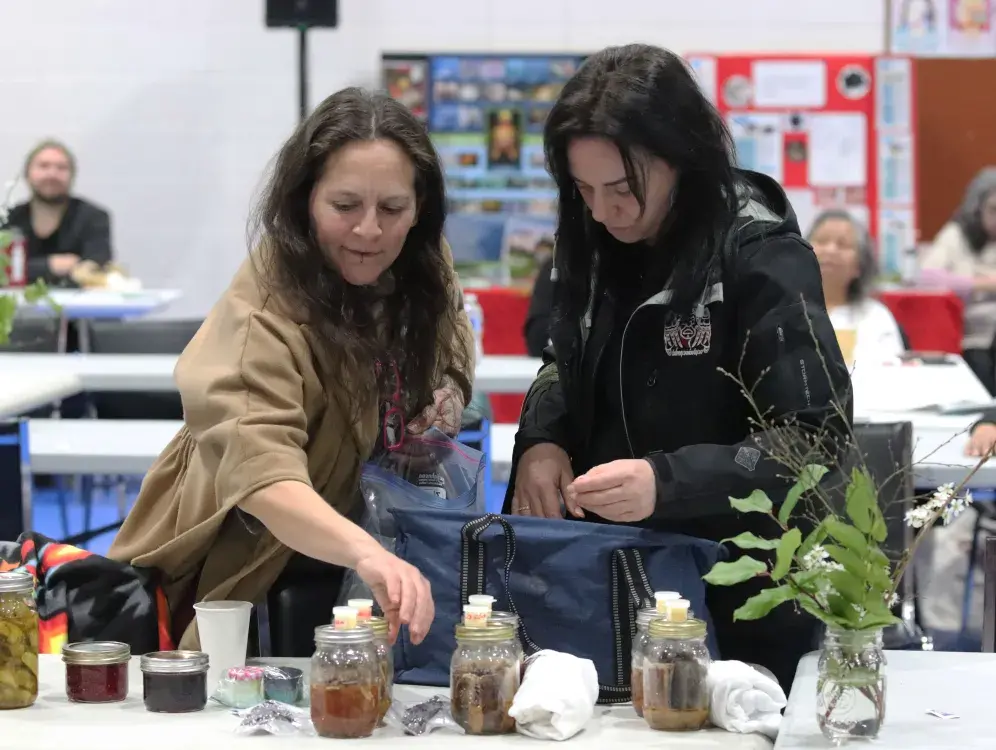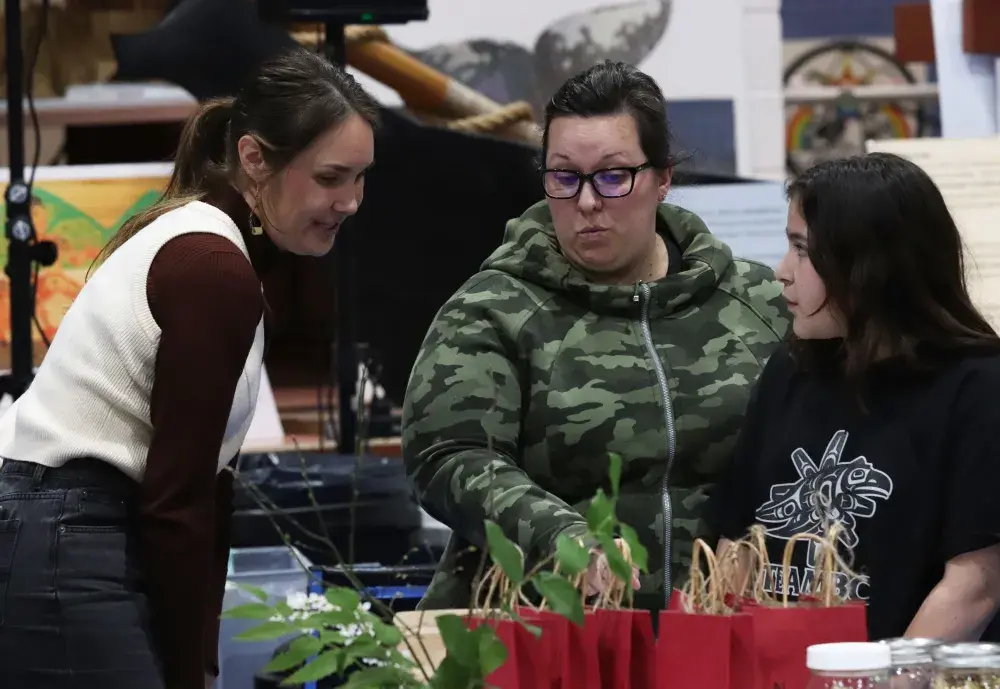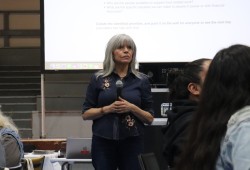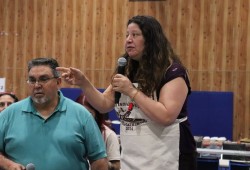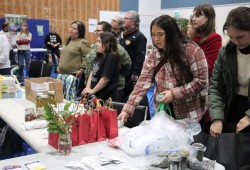In late March Nuu-chah-nulth and surrounding communities gathered at Maht Mah’s for Ahousaht’s food sovereignty event. After a full day of presentations, attendees and presenters gathered to competitively trade teas, herbs, seeds, smoked sockeye, soaps, and other goods, representing an economy that traces back thousands of years.
“Traditionally, we had vast trade routes,” said Nitanis Desjarlais, a traditional food advocate, noting there was language associated with trading. “It opened up our plates to this variety of foods, and it strengthened our relationships.”
“It was a currency,” added Desjarlais. “And it still is now.”
According to a University of British Columbia document, the First Nations of B.C. were the most “active and expert” traders in North America, in some cases an economy traced back to 8,000 years ago.
Nuu-chah-nulth traded dried herring, halibut and cedar baskets for camas bulbs and swamp rushes (used to make mats) with the Coast Salish, reads the document.
“We were wealthy, very wealthy because it was managed as such,” said Archie Little of his Nuu-chah-nulth nation, Nuchatlaht.
Though herring season is in spring, Little shared that historically, smoked, dried and salted herring and roe was a delicacy known to Nuchatlaht year-round.
“We had tons and tons and tons of herring and roe,” said Little. “It was shared, it was traded, it was potlatched.”
“The Nuchatlaht people ensured Nuchatlaht was always wealthy and we only took what we needed,”added Little, noting that this preserved traditional resources for generations to come.
For Nuchatlaht, because of their wealthy and rich hahaoulthee they didn’t have a need travel anywhere else to secure resources, said Little. Though, he noted that others would travel to Nuchatlaht territory for their wealth of resources.
Little reflects on a grass that grows on one of the island’s in Nuchatlaht territory, that he’s been taught was traded with East Coast Native Americans.
“They’d come up here to get that grass from Nuchatlaht,” he said.
When other nations would access resources on Nuchatlaht territory, they would give a portion to the chief, who would then feed his community, said Little.
“The ḥaw̓iiḥ, the chiefs, had respect for each other,” said Little. “If they accessed [resources] out of Nuchatlaht hahoulthee, they paid taxes.”
“That’s what we need to get back to,” he added.
Despite the wealth of Nuchatlaht hahoulthee, due to government policy and regulations the First Nation’s members now leave their territory to fish and make a living, said Little.
“We had a healthy economy, except it benefited everybody, not just the richest guy on the reserve, but everybody was rich,” he explained.
When colonization met the shores of the west coast of Vancouver Island, a new capitalist economy was implemented, which Little says was focused on achieving personal gain.
“They seen the wealth of the people, the wealth of the land, wealth of the ocean, and wealth of the air, but they didn't like how it was utilized,” he said.
“It’s like a thread. If we don’t do it right, that thread breaks, then we have nothing,” said Little. “Then, what do I leave my children, what do I leave my grandchildren?”
According to Statistics Canada, in 2022 Indigenous families who were above the poverty line experienced food insecurity at a rate of 31 per cent - more than double that of non-Indigenous households. For families living off reserve, the food insecurity rate amounted to 34 per cent.
“Indigenous food sovereignty is even more specific to Indigenous peoples and our knowing the significant role that we've played, that our bio-cultural heritage has played in contributing to the food system,” said Dawn Morrison of Secwépemc, a keynote speaker at Ahousaht’s Food Sovereignty event. “And yet, we still experience these gaps.”
When agriculture was introduced to B.C. in the 1800s the Indian Act, Civilization Act, and B.C. Land Act were also implemented, which dispossessed First Nations from their land and culture, said Morrison,
“That displaced us and imposed a settler colonial narrative of agriculture that saw hunters and gatherers as inferior,” said Morrison.
“The traditional economies have withstood the test of time,” she continued. “It's not just the food, it's also the knowledge around the food that we share.”
Morrison continues to see traditional rituals and protocols practiced by every First Nation that she’s been to.
“People are still giving and sharing and trading and have values around learning to live with less,” said Morrison. “That's a very different economy than the capitalist model that we're kind of being forced to work in.”
According to Little, trading still occurs throughout Nuu-chah-nulth through events such as potlatches. He also notes that commercial fisheries contribute to Nuchatlaht for obtaining resources in their territory.
“It’s still going on today, not as big, but it's still happening,” said Little.
But for Jeneva Touchie (Huḥtik) of Yuułuʔiłʔatḥ, in the face of road closures and wildfires, establishing food trading networks throughout the nations of Nuu-chah-nulth means ensuring the needs of each community are taken care of.
“We’d be able to kind of just interact with each other and really uphold each other as nations and to ensure food security for all of our citizens and our members,” said Touchie, noting that if one nation had an abundance of one resource and a lack of another, they could trade for the resource they need. “It’s something that we definitely need to get back to.”
“I've been trading food for most of my life,” said Desjarlais, who trades food in important places to her, like her hometown of Prince Rupert or in Northern Alberta, where her mother is from.
For Desjarlais, the stories and culture that accompany food makes each item more valuable in a trade.
“If there's money exchanged, it wouldn’t even come close, that’s why I don’t sell my food,” she said.
“Food is always the base of who we are,” said Touchie of what she has learned from her elders. “Everyone took care of each other.”

